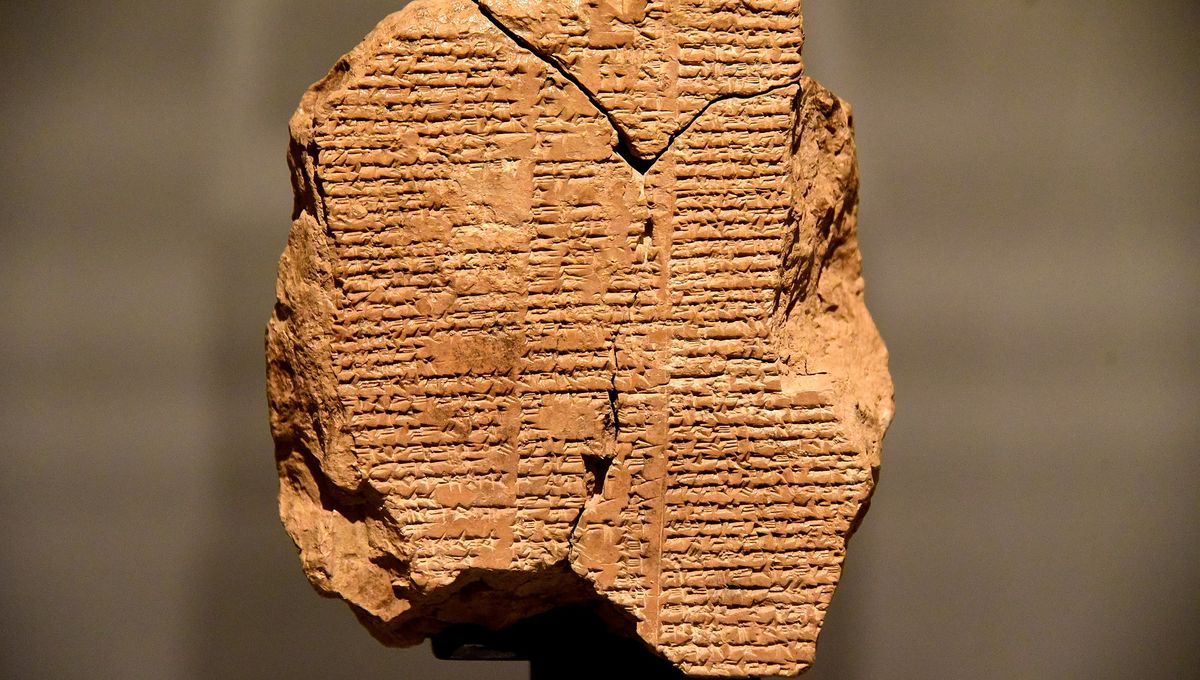
The flood story you may be most familiar with is probably Noah’s Ark, but it’s far from the only tale of a great flood sent by a god to destroy a civilization. There are eight basic plots in storytelling, not seven: Overcoming the monster, rags to riches, the quest, voyage and return, comedy, tragedy, rebirth – and religious folk escape god’s wrath by making a big boat.
According to one early flood myth, the Babylonian god Ea sent a flood that wipes out all of humanity except for Uta–napishti (also known as Utnapishtim) and his family, who safely stow away on an ark full of animals while everybody else drowns. Sounds familiar? It should do: The Babylonian story – etched on 3,000-year-old clay tablets forming part of the Epic of Gilgamesh – is thought to have inspired the Bible’s version.
Where it differs, according to Dr Martin Worthington of the University of Cambridge in his book Ea’s Duplicity in the Gilgamesh Flood, is the way in which the ark was loaded. An Assyriologist who specializes in Babylonian, Assyrian, and Sumerian grammar, literature, and medicine, Dr Worthington analyzed Ea’s nine-line message etched into the ancient tablets and concluded the Babylonian people were tricked into building the ark by the god Ea.
“Ea tricks humanity by spreading fake news. He tells the Babylonian Noah, known as Uta–napishti, to promise his people that food will rain from the sky if they help him build the ark,” Worthington explained back in 2019 when the book was published.
“What the people don’t realise is that Ea’s nine-line message is a trick: it is a sequence of sounds that can be understood in radically different ways, like English ‘ice cream’ and ‘I scream’.”
“While Ea’s message seems to promise a rain of food, its hidden meaning warns of the Flood,” he continued. “Once the ark is built, Uta–napishti and his family clamber aboard and survive with a menagerie of animals. Everyone else drowns. With this early episode, set in mythological time, the manipulation of information and language has begun. It may be the earliest ever example of fake news.”
The key tricksy bit comes down to two lines, which can be interpreted in several ways:
“ina šēr(-)kukkī” and “ina lilâti ušaznanakkunūši šamūt kibāti”
The positive interpretation, Worthington translates, tells the people that “at dawn there will be kukku-cakes, in the evening he will rain down upon you a shower of wheat.” Meanwhile, there are several negative ways the same sentence can be interpreted. Worthington suggests they could also be interpreted to mean:
“By means of incantations, by means of wind-demons, he will rain down upon you rain as thick as (grains of) wheat,” and “at dawn, he will rain down upon you darkness (then) in (this) pre-nocturnal twilight he will rain down upon you rain as thick as (grains of) wheat.”
Essentially, people in the myth appear to have looked at a literal “cake or death” scenario and interpreted it as cake. In the tale, they help Uta–napishti to load up his ark with animals, and are promptly killed by drowning for their troubles. Which is very poor etiquette after you’ve helped somebody move.
“Ea is clearly a master wordsmith who is able to compress multiple simultaneous meanings into one duplicitous utterance,” Worthington said. Basically, it’s a pun where the consequence of interpreting it wrongly was the death of the whole of humanity, bar one family. What a trickster.
Apart from the obvious similarities in the tales, the god of the Gilgamesh myth had different motivations from the god of the Bible.
“Babylonian gods only survive because people feed them,” Worthington said. “If humanity had been wiped out, the gods would have starved. The god Ea manipulates language and misleads people into doing his will because it serves his self-interest. Modern parallels are legion!”
An earlier version of this article was published in January 2021.
Source Link: Ancient Babylonian Flood Myth That Inspired Biblical Tale Had A Dark Twist